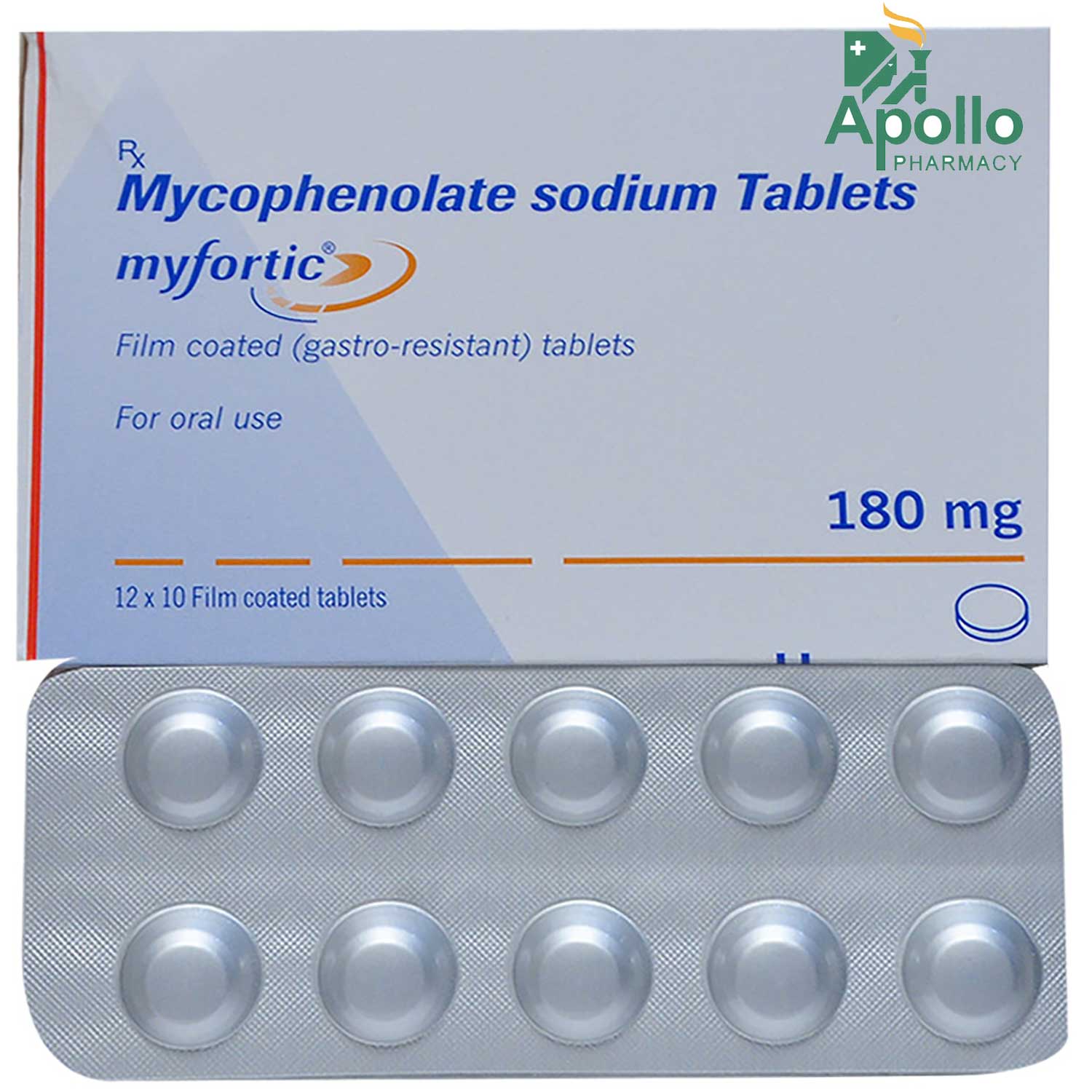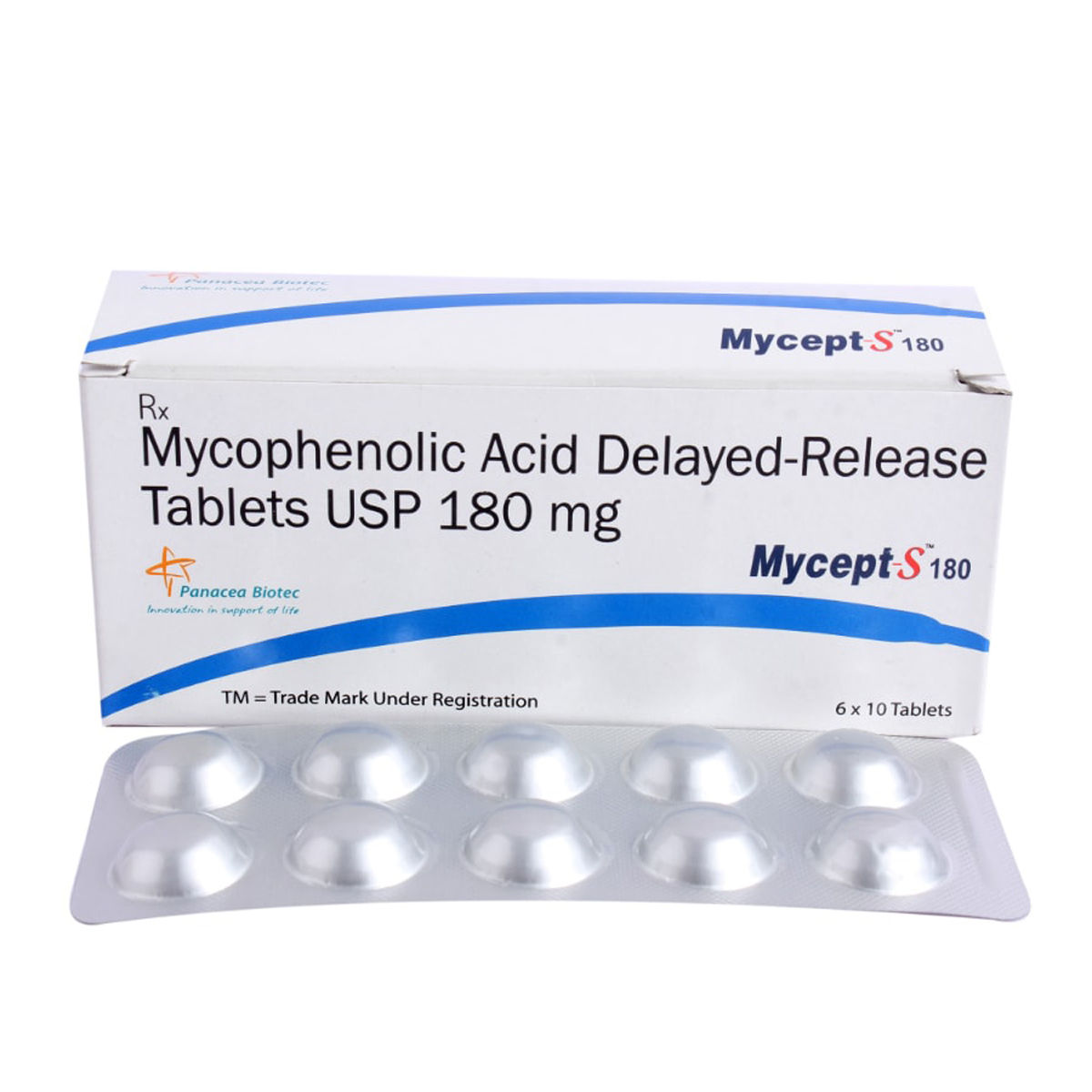Mycophenolic Acid
About Mycophenolic Acid
Mycophenolic Acid belongs to a class of drugs called immunosuppressants. These drugs are used to prevent rejection of a transplanted organ such as a liver, kidney, or heart. Organ rejection occurs when a patient’s immune system recognizes the donor organ as foreign and tries to eliminate it.
Mycophenolic Acid contains Mycophenolic acid, which decreases the production of white blood cells that usually attack foreign invaders and defend the body against foreign cells and infection. As a result, it prevents organ rejection in transplanted patients and helps the body accept the new organ.
Common side effects of Mycophenolic Acid may include stomach pain, vomiting, diarrhoea, high blood pressure, or swelling of the lower legs, feet, and ankles. Most of these side effects of Mycophenolic Acid do not require medical attention and gradually resolve over time. However, if the side effects persist or worsen, please consult your doctor.
Please tell your doctor if you are allergic to medicines or food products. If you are pregnant or a breastfeeding mother, it is advised to inform your doctor before taking Mycophenolic Acid. You or your partner are advised to use effective contraceptive measures before starting treatment with Mycophenolic Acid or for 90 days after treatment with Mycophenolic Acid. Limit or avoid alcohol consumption with Mycophenolic Acid as it may increase the risk of liver damage. Drive only if you are alert after taking Mycophenolic Acid, as it may cause drowsiness, confusion, or numbness in a few patients.
Uses of Mycophenolic Acid
Medicinal Benefits
Mycophenolic Acid contains Mycophenolic Acid, an immunosuppressant used to prevent organ rejection after a heart, kidney, or liver transplant. Mycophenolic Acid is combined with other medications, such as corticosteroids and immunosuppressants. Mycophenolic Acid inhibits the body's production of white blood cells, which usually attack foreign invaders and protect the body from foreign cells and infection. As a result, it prevents organ rejection in transplanted patients and aids the body's acceptance of the new organ.
Directions for Use
Storage
Side Effects of Mycophenolic Acid
- Shortness of breath
- Acne
- Weakness (asthenia)
- Muscle pain (myalgia)
- Swollen hands, ankles or feet
- Itching
- Respiratory infections
- Cough
- Headache
Drug Warnings
Please tell your doctor if you are allergic to any medicine or foods. If you are pregnant or a breastfeeding mother, it is advised to inform your doctor before taking Mycophenolic Acid. You or your partner are advised to use effective contraceptive measures before starting treatment with Mycophenolic Acid, while taking Mycophenolic Acid and for 90 days after stopping treatment with Mycophenolic Acid. Limit or avoid alcohol consumption with Mycophenolic Acid as it may increase the risk of liver damage. Drive only if you are alert after taking Mycophenolic Acid, as it may cause drowsiness, confusion or numbness in some patients. If you are about to get vaccinated, inform your doctor before taking Mycophenolic Acid. Mycophenolic Acid may increase the risk of infections or skin cancer as it lowers the body’s immune defence system. While taking Mycophenolic Acid, you are advised to wear protective clothing and use sunscreen while going out.
Drug Interactions
Drug-Drug Interactions: Mycophenolic Acid may interact with various medications, including antibiotics (e.g., amoxicillin, azithromycin), vaccinations (e.g., BCG vaccine, cholera vaccine live), immunosuppressive medications (e.g., etanercept), hormonal medications (e.g., levonorgestrel, norethindrone), and antimicrobials (e.g., tinidazole).
Drug-Food Interactions: Avoid alcohol consumption while taking Mycophenolic Acid as it may increase dizziness.
Drug-Disease Interactions: Mycophenolic Acid may cause interactions with disease conditions such as cancer, liver disease (such as hepatitis B, hepatitis C), current/past infections, serious digestive problems, rare genetic disorders (such as Lesch-Nyhan or Kelley-Seegmiller syndromes).
Drug-Drug Interactions Checker List:
Safety Advice

Alcohol
cautionYou are recommended to avoid alcohol consumption while taking Mycophenolic Acid. It could lead to increased dizziness and drowsiness.

Pregnancy
unsafeMycophenolic Acid may cause birth defects and miscarriage if taken during pregnancy. Follow contraception advice given by your doctor if you are a woman who could become pregnant. Also, undergo a pregnancy test before starting treatment with Mycophenolic Acid.

Breast Feeding
unsafeIt is not recommended to take Mycophenolic Acid while you are breastfeeding. Mycophenolic Acid passes into breast milk.

Driving
cautionMycophenolic Acid may cause dizziness and tiredness; do not drive or operate heavy machinery if you feel dizzy.

Liver
cautionTake Mycophenolic Acid only after the doctor's prescription, especially if you have liver diseases/conditions, as your doctor may adjust the dose as required.

Kidney
cautionTake Mycophenolic Acid only after the doctor's prescription, especially if you have kidney diseases/conditions, as your doctor may adjust the dose as required.

Children
unsafeMycophenolic Acid should not be used by children and adolescents under 18 years of age, as its efficacy and safety have not been established.
Habit Forming
Diet & Lifestyle Advise
- Physical activity strengthens muscles and relieves joint stiffness. Gentle activities like 20-30 minutes of walking or swimming are helpful.
- Performing yoga may also help in improving joint flexibility and pain management.
- Maintain a healthy weight by performing regular low-strain exercises and eating nutritious food.
- Get adequate sleep, as resting the muscles can help reduce inflammation and swelling.
- Follow heat or cold therapy and regularly apply a cold or hot compress to the joints for 15-20 minutes.
- De-stress yourself by meditating, reading books, taking a warm bubble bath, or listening to soothing music.
- Acupuncture, massage, and physical therapy may also be helpful.
- Eat food rich in antioxidants such as berries, spinach, kidney beans, dark chocolate, etc.
- Foods containing flavonoids help in reducing inflammation. These include soy, berries, broccoli, grapes, and green tea.
- Avoid smoking and alcohol consumption.
Special Advise
- Use sunscreen while taking Mycophenolic Acid, as it can make your skin more sensitive to sunlight and may cause skin cancer.
- Do not donate blood while using this medication and for 6 weeks after stopping it. Do not donate sperm while using this medication and for 90 days after stopping it.
Patients Concern
Disease/Condition Glossary
Organ rejection: It occurs when the patient’s immune system recognizes the donor organ as foreign and tries to eliminate it. Organ rejection may be hyperacute (occurs in minutes to hours), acute (occurs within the first few months), or chronic (occurs after a year or anytime beyond). The symptoms of organ rejection may vary based on the type of organ transplant you have had. However, if you experience pain, fever, or any other signs of illness, contact your doctor immediately.
FAQs
Mycophenolic Acid belongs to the class of medicines called immunosuppressants used to prevent organ rejection after kidney transplant.
Mycophenolic Acid might cause leukopenia (decreased number of white blood cells) and may make you more susceptible to infections. Consult your doctor if you develop any signs of infections such as fever, sore throat, breathlessness, jaundice, unexplained bleeding, or bruising.
If you miss a dose of Mycophenolic Acid, take the missed dose as soon as you remember it. However, if it's almost time for the next dose, do not take a double dose to make up for a missed one.
Diarrhoea might be a side-effect of Mycophenolic Acid. Drink lots of fluids and eat food rich in fibre if you experience diarrhoea. If you find blood in stools (tarry stools) or if you experience prolonged diarrhoea, consult your doctor. Do not take anti-diarrheal medicine on your own.
Mycophenolic Acid works by controlling the immune system's response to the transplanted organ and is given along with other medications that suppress the immune system.
Some medicines might absorb mycophenolic acid delayed or absorbed fast if taken concomitantly such as antacids containing aluminium or magnesium, colestipol, cholestyramine, or calcium-free phosphate binders. Before taking Mycophenolic Acid, speak with your doctor about your ongoing medication list. Your doctor will decide whether they should be taken along with Mycophenolic Acid or not.
The live vaccine may not work well while on treatment with Mycophenolic Acid. Do not have immunizations/vaccinations without talking to your doctor first. Also, avoid contact with people who recently had immunizations/vaccinations.
Mycophenolic Acid may increase your risk of developing certain types of cancer. It is essential to talk to your doctor regularly about your risk of cancer and any symptoms you might be experiencing.
Mycophenolic Acid is a common immunosuppressant medication prescribed after a kidney transplant. Its primary purpose is to prevent your body from rejecting the transplanted kidney.
Mycophenolic Acid is neither a steroid nor a chemotherapy medication. It's an immunosuppressant, which means it works by suppressing the immune system to prevent organ rejection. Regarding hair loss, MPA can sometimes cause hair loss as a side effect. However, this is not a common side effect, and hair loss is usually resolved after the medication is stopped or the dosage is adjusted.
While taking Mycophenolic Acid, you will likely need to undergo regular tests. These tests help monitor your kidney function, blood cell counts, and overall health.
Immunosuppressants like Mycophenolic Acid are essential for preventing organ rejection, but they can also compromise your immune system, increasing your risk of infections. Viral infections like chickenpox and shingles, caused by the varicella-zoster virus, can pose a significant health threat to individuals with weakened immune systems. If you're exposed to someone with these conditions, seek immediate medical advice. Your doctor may recommend preventive measures, such as antiviral medications, to reduce your risk of complications.
Women taking Mycophenolic Acid should avoid pregnancy, as it can harm the fetus. Effective birth control is crucial. If pregnancy occurs, stop the medication immediately and consult a doctor. Additionally, breastfeeding should be avoided due to the risk of medication passing through breast milk. Regular check-ups, informing healthcare providers, and monitoring for side effects are essential.
Men should be aware of the potential for reduced sperm count and fertility while taking this medication. Discuss this with your doctor if you plan to start a family. It's also important to use effective birth control to prevent pregnancy in your female partner. Regular check-ups and monitoring for side effects are essential. If you have concerns, consult your doctor.
No, you should never stop taking Mycophenolic Acid without consulting your doctor. Sudden discontinuation can lead to organ rejection.
It's essential to consult your doctor before taking any over-the-counter medicines while on Mycophenolic Acid. Some medications may interact with it and affect its effectiveness.
Common side effects of Mycophenolic Acid may include stomach pain, vomiting, diarrhoea, high blood pressure, or swelling of the lower legs, feet, and ankles. Most of these side effects of Mycophenolic Acid do not require medical attention and gradually resolve over time. However, if these side effects persist or worsen, please consult your doctor.
Yes, Mycophenolic Acid can interact with other medications, especially other immunosuppressants, antibiotics, and antifungal agents. Discuss all the medications you are taking with your doctor and seek appropriate advice.
It's generally recommended to avoid excessive alcohol consumption while taking Mycophenolic Acid, as it can increase the risk of side effects.
If you have other health conditions, such as diabetes or heart disease or any, discuss them with your doctor before starting Mycophenolic Acid. Your doctor will weigh the benefits and potential risks before prescribing Mycophenolic Acid.










